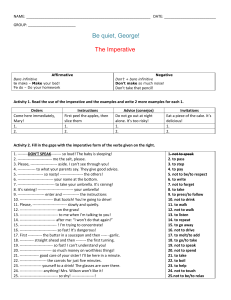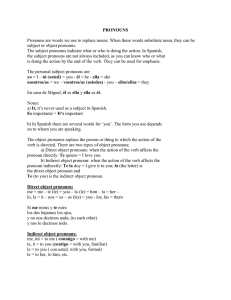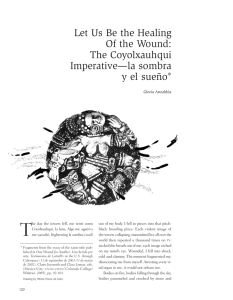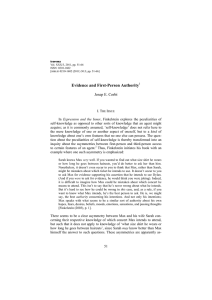17.4 Position of object pronouns with the imperative. When an
Anuncio
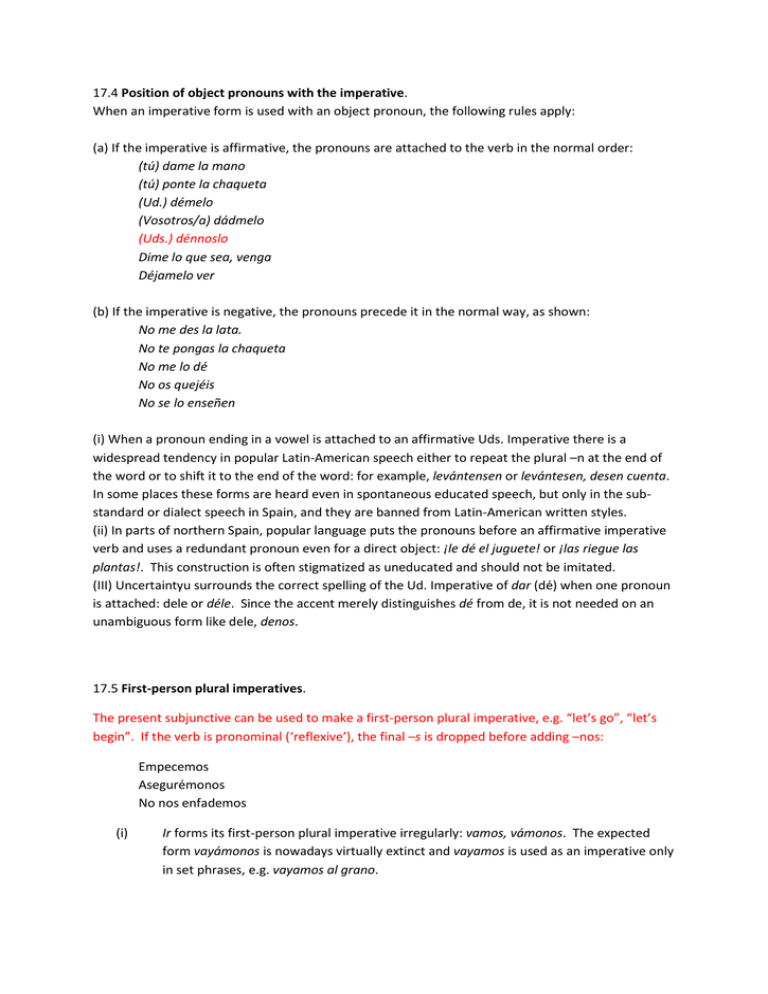
17.4 Position of object pronouns with the imperative. When an imperative form is used with an object pronoun, the following rules apply: (a) If the imperative is affirmative, the pronouns are attached to the verb in the normal order: (tú) dame la mano (tú) ponte la chaqueta (Ud.) démelo (Vosotros/a) dádmelo (Uds.) dénnoslo Dime lo que sea, venga Déjamelo ver (b) If the imperative is negative, the pronouns precede it in the normal way, as shown: No me des la lata. No te pongas la chaqueta No me lo dé No os quejéis No se lo enseñen (i) When a pronoun ending in a vowel is attached to an affirmative Uds. Imperative there is a widespread tendency in popular Latin-American speech either to repeat the plural –n at the end of the word or to shift it to the end of the word: for example, levántensen or levántesen, desen cuenta. In some places these forms are heard even in spontaneous educated speech, but only in the substandard or dialect speech in Spain, and they are banned from Latin-American written styles. (ii) In parts of northern Spain, popular language puts the pronouns before an affirmative imperative verb and uses a redundant pronoun even for a direct object: ¡le dé el juguete! or ¡las riegue las plantas!. This construction is often stigmatized as uneducated and should not be imitated. (III) Uncertaintyu surrounds the correct spelling of the Ud. Imperative of dar (dé) when one pronoun is attached: dele or déle. Since the accent merely distinguishes dé from de, it is not needed on an unambiguous form like dele, denos. 17.5 First-person plural imperatives. The present subjunctive can be used to make a first-person plural imperative, e.g. “let’s go”, “let’s begin”. If the verb is pronominal (‘reflexive’), the final –s is dropped before adding –nos: Empecemos Asegurémonos No nos enfademos (i) Ir forms its first-person plural imperative irregularly: vamos, vámonos. The expected form vayámonos is nowadays virtually extinct and vayamos is used as an imperative only in set phrases, e.g. vayamos al grano. (ii) With the exception of vámonos, informal spoken language tends to avoid this construction. This is usually done by using ir a or sometimes simply a and an infinitive, e.g. vamos a sentarnos, bueno a levantarse. Thus no nos enfademos may be expressed by no nos vamos a enfadar. (iii) Double s is not found in Spanish, so one s is dropped in cases like the following: digámoselo (not digámosselo) or démoselos. Source: Butt, John and Carmen Benjamin. A New Reference Grammar of Modern Spanish. NY: McGraw-Hill, 2004. P. 291. Curious note: Although no -sn word exists in Spanish, there are approximately 83 -nn words in Spanish, for example: Cannabis= Cáñamo índico, usado como estupefaciente. Circunnavegación= Dicho de un buque: Dar la vuelta al mundo. Connacional= Que pertenece a la misma nación que otro. Connotar= Dicho de una palabra: Conllevar, además de su significado propio o específico, otro de tipo expresivo o apelativo. Ennegrecer=poner negro, oscurecer. Ennoblecer= Hacer noble a alguien o adornar, enriquecer una ciudad, un templo, etc. Innacible= Que no puede nacer. Innato= Connatural y como nacido con la misma persona. Innovación= Creación o modificación de un producto, y su introducción en un mercado. Innumerable= Incalculable. Muy grande o muy numeroso. Perennemente= Incesantemente, continuamente. Prima donna= Protagonista femenina de una ópera. Sinnúmero= Número incalculable de personas o cosas.
